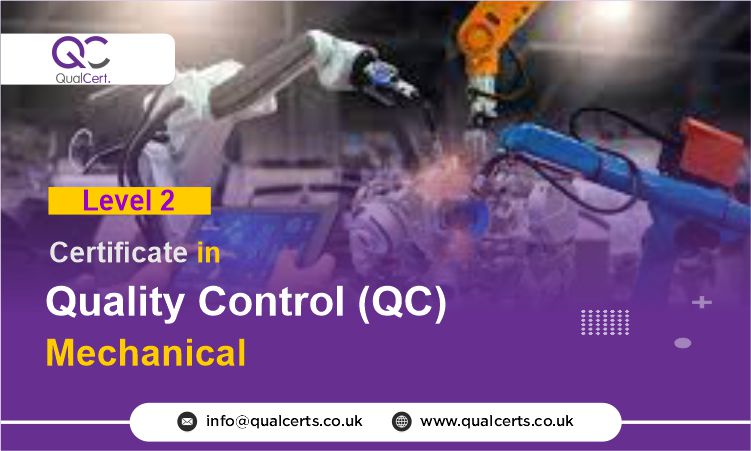In today’s competitive engineering and manufacturing landscape, ensuring high standards of quality control is paramount. The QualCert Level 2 Certificate in Quality Control ( QC ) Mechanical is designed to equip professionals with the essential skills and knowledge needed to uphold rigorous quality standards in mechanical engineering and manufacturing processes. This certification program serves as a valuable asset for individuals looking to advance their careers in quality assurance or enhance their expertise in mechanical systems.
Participants in the Level 2 QC Mechanical certification program delve into the foundational principles of quality control specific to mechanical engineering. This includes understanding industry standards, measurement techniques, and inspection methodologies critical to maintaining precision and reliability in mechanical components and systems.
Compliance with industry regulations and standards is essential in mechanical engineering. The certification program covers the latest ISO standards, safety regulations, and quality management systems relevant to mechanical manufacturing processes. Participants gain insights into how adherence to these standards can optimize product quality and ensure regulatory compliance.
The QualCert Level 2 Certificate in Quality Control ( QC ) Mechanical is a pivotal certification for individuals looking to excel in mechanical quality control roles. By acquiring this certification, professionals not only deepen their understanding of quality control principles and techniques but also contribute to maintaining high standards of precision and reliability in mechanical engineering and manufacturing. Whether you’re aiming to advance your career or enhance your skills, this certification provides the knowledge and recognition needed to succeed in today’s competitive industrial landscape.
Course Contents of Level 2 Certificate in Quality Control ( QC ) Mechanical
The QualCert Level 2 Certificate in Quality Control ( QC ) Mechanical comprises several study units designed to provide learners with a comprehensive understanding of QC principles and practices in the mechanical sector. Below is the qualification structure, including the Total Qualification Time (TQT) 75, Guided Learning Hours (GLH) 50, and 15 Credits associated with the program.
| Unit Ref# | Unit Title | Credits | GLH | TQT |
| QC12005 – 1 | Mechanical Quality Assurance and Compliance | 3 | 10 | 15 |
| QC12005 – 2 | Advanced Dimensional and Tolerance Testing | 3 | 10 | 15 |
| QC12005 – 3 | Failure Analysis and Preventive Measures | 3 | 10 | 15 |
| QC12005 – 4 | ISO 9001 and ISO 16949 Compliance | 3 | 10 | 15 |
| QC12005 – 5 | Lean Manufacturing and Quality Improvement | 3 | 10 | 15 |
Entry Requirements for the Level 2 Certificate in Quality Control ( QC ) Mechanical
To enroll in the QualCert Level 2 Certificate in Quality Control (QC) Mechanical, candidates must meet the following entry requirements:
- A high school diploma or an equivalent qualification is required.
- Proficiency in the language of instruction, typically English, is essential.
- Basic knowledge of mechanical processes or quality control principles is recommended.
- Completion of a Level 1 qualification in Quality Control (QC) Mechanical or a related field is preferred but not mandatory.
Learning Outcomes: Level 2 Certificate in Quality Control ( QC ) Mechanical
Mechanical Quality Assurance and Compliance
- Understand the principles of quality assurance in mechanical engineering.
- Implement compliance strategies to meet industry and regulatory standards.
- Develop quality control documentation and audit processes.
Advanced Dimensional and Tolerance Testing
- Perform precise dimensional measurements using advanced metrology tools.
- Interpret tolerance limits and geometric dimensioning specifications.
- Analyze deviations and implement corrective actions in mechanical components.
Failure Analysis and Preventive Measures
- Identify common failure modes in mechanical systems and components.
- Apply failure analysis techniques such as FMEA (Failure Modes and Effects Analysis).
- Develop preventive maintenance strategies to enhance mechanical reliability.
ISO 9001 and ISO 16949 Compliance
- Interpret key principles and requirements of ISO 9001 and ISO 16949.
- Apply international quality management standards in mechanical processes.
- Ensure product and process compliance through audits and quality assessments.
Lean Manufacturing and Quality Improvement
- Understand lean manufacturing principles and their impact on quality control.
- Implement waste reduction techniques to enhance process efficiency.
- Use continuous improvement methodologies like Kaizen and Six Sigma.
The Level 2 Certificate in Quality Control (QC) Mechanical is designed for individuals who are:
- Aspiring Quality Control Inspectors: Those looking to enter or advance in roles where they inspect mechanical components and ensure they meet specified standards.
- Mechanical Engineers and Technicians: Professionals involved in designing, manufacturing, or maintaining mechanical systems, seeking to deepen their understanding and application of quality control principles.
- Manufacturing Professionals: Individuals working in manufacturing environments where ensuring the quality and reliability of mechanical products is critical to operational success.
- Quality Assurance Specialists: Professionals focused on maintaining and improving quality management processes within mechanical engineering contexts, aiming to enhance their expertise in quality control.
- Career Changers or Upgraders: Individuals transitioning into mechanical quality control roles from related fields, looking to acquire specialized knowledge and skills to excel in their new career path.
- Students and Recent Graduates: Those completing their education in mechanical engineering or related disciplines, interested in gaining practical skills and certification to enhance their employability.
- Anyone Interested in Mechanical Quality Control: Enthusiasts and learners passionate about mechanical systems and interested in understanding and contributing to quality control practices in manufacturing.
The course caters to a diverse range of learners who wish to play a pivotal role in maintaining high standards of quality and reliability in mechanical engineering and manufacturing industries.

